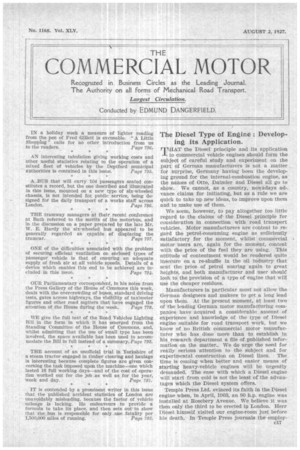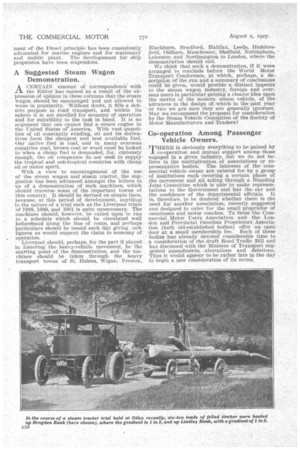The Diesel Type of Engine : Developing its Application.
Page 39

Page 40

If you've noticed an error in this article please click here to report it so we can fix it.
91.HAT the Diesel principle and its application Jto commercial vehicle engines should form the subject of careful study and experiment on the part of German manufacturers is not a matter for surprise, Germany having been the developing ground for the internal-combustion engine, as the names of Otto, Daimler and Diesel all go to show. We cannot, as a country, nowadays advance claims for initiating, but as a rule we are quick to take up new ideas, to improve upon them and to make use of them.
We seem, however, to pay altogether too little regard to the claims of the Diesel principle for consideration in connection with road transport vehicles. Motor manufacturers are content to regard the petrol-consuming engine as sufficiently satisfactory for the moment, whilst commercial motor users are, again for the moment, content with the price of the fuel they are using. This attitude of contentment would be rendered quite insecure on a re-shuffle in the oil industry that sent the price of petrol soaring again to great heights, and both manufacturer and user shouW look to the provision of a type of engine that will use the cheaper residues.
Manufacturers in particular must not allow the German designers and makers to get a long lead upon them. At the present moment, at least two of the leading German motor manufacturing companies have acquired a considerable amount of experience and knowledge, of the type of Diesel engine suitable for road transport work, but we know of no British commercial motor manufacturer who has done more than to establish in his research department a file of published information on the matter.. We do urge the need for really serious attention to the subject and for experimental construction on Diesel lines. The time is coming when better and easier means of starting heavy-vehicle engines will be urgently demanded. The ease with which a Diesel engine will start from cold is not the least of the advantages which the Diesel system offers,.
Temple Press Ltd. evinced its faith in the Diesel engine when, in April, 1903, an SO h.p. engine was installed at Rosebery Avenue. We believe it was then only the third to be erected ip London. Herr Diesel himself visited our engine-room just before his death. In Temple Press journals the employ meat of the Diesel principle has been consistently advocated for marine engines and for stationary and mobile plant. The developments for ship propulsion have been stupendous.
A Suggested Steam Wagon Demonstration. ,
ACERTAIN amount of correspondence' with the Editor has ensued as aresult of the expression of opinion in these columns that the steam wagon should be encouraged and not allowed to wane in popularity. Without doubt, it fills a definite purpose in road transport, and within its sphere it is not excelled for economy of operation and for suitability to the task in hand. It is no argument that one cannot find a steam engine in the United States or America. With vast quantities of oil constantly exuding, oil and its derivatives form the cheapest and best available fuel. Our native fuel is coal, and in many overseas countries coal, brown coal or wood must be looked to when a cheap fuel is demanded, for, curiously enough, the oil companies do not seek to supply the tropical and sub-tropical countries with cheap oil or Motor spirit.
With a view to encouragement of the use of the steam wagon and steam tractor, the suggestion has been advanced amongst the letters to us of a demonstration of such machines, which should traverse some of the important towns of this country. It should be devised on simple lines, because; at this period of development, anything in the nature of a trial such as the Liverpool trials of 1898, 1899, and 1991 is quite unnecessary. The machines should, however, be called upon to run to a schedule which should be circulated well beforehand along the line of route, and perhaps Particulars should be issued each day giving ,,uch figures as would support the claim to economy of operation.
• Liverpool should, perhaps, for the part it played in fostering the heavy-vehicle movement, be the starting point of the demonstration, and the machines should be taken through the heavy transport towns of St. Helens, Wigan, Preston, Blackburn, Bradford, Halifax, Leeds, Huddersfield, Oldham, Manchester, Sheffield, Nottingham, Leicester and Northampton to London, where the demonstration should end.
We think that such a demonstration, if it were arranged to conclude before the World Motor Transport Conference, at which, perhaps, a description of the run and a summary of conclusions could be given, would provide a distinct impetus to the steam wagon industry, foreign and overseas users in particular gaining a clearer idea upon the merits of the modern steam vehicle, of the advances in the design of which in the past year or two we are sure they are generally ignorant. May we recommend the proposal for consideration by the Steam Vehicle Committee of the Society of Motor Manufacturers and Traders? ,
Co-operation Among Passenger Vehicle Owners.
THERE is obviously everything to be gained by co-operation and mutual support among those engaged in a given industry, but we do not believe in the multiplication of associations or representative bodies. The interests of the commercial vehicle owner are catered for by a group of institutions each covering a certain phase of the movement and all acting through a Standing Joint Committee which is able to make repiesentations to the Government and has the ear and the confidence of the departmental officials. It is, therefore, to be doubted whether there is the need for another association, recently suggested and designed to cater for the small proprietor of omnibuses and motor coaches. To these the Commercial Motor Users Association and the London and Provincial Omnibus Proprietors Association (both old-established bodies) offer an open door at a small membership fee. Each of these bodies has already devoted considerable time to a consideration of the draft Road Traffic Bill and has discussed with the Minister of Transport suggested amendments, alterations and deletions. Thus it woilld appear to be rather late in the day to begin a new consideration of its terms.












































































































